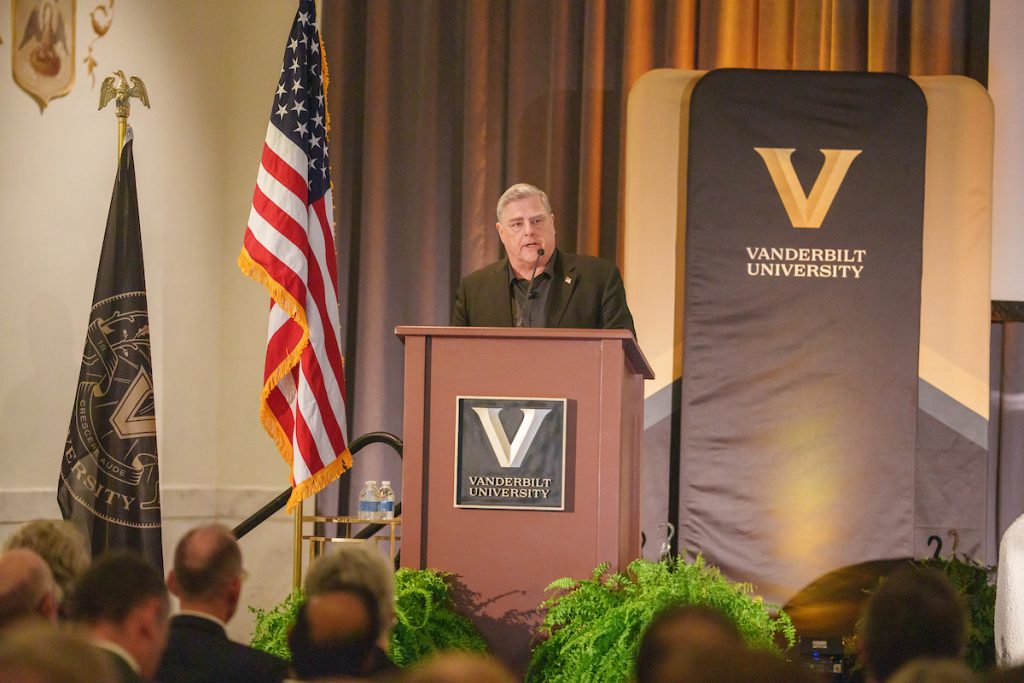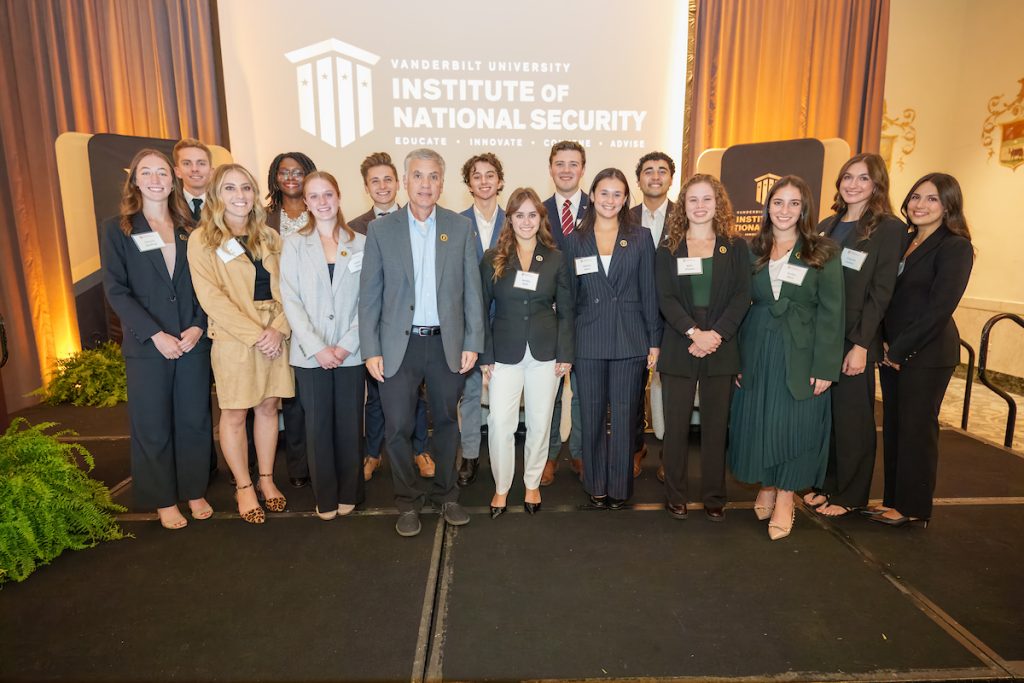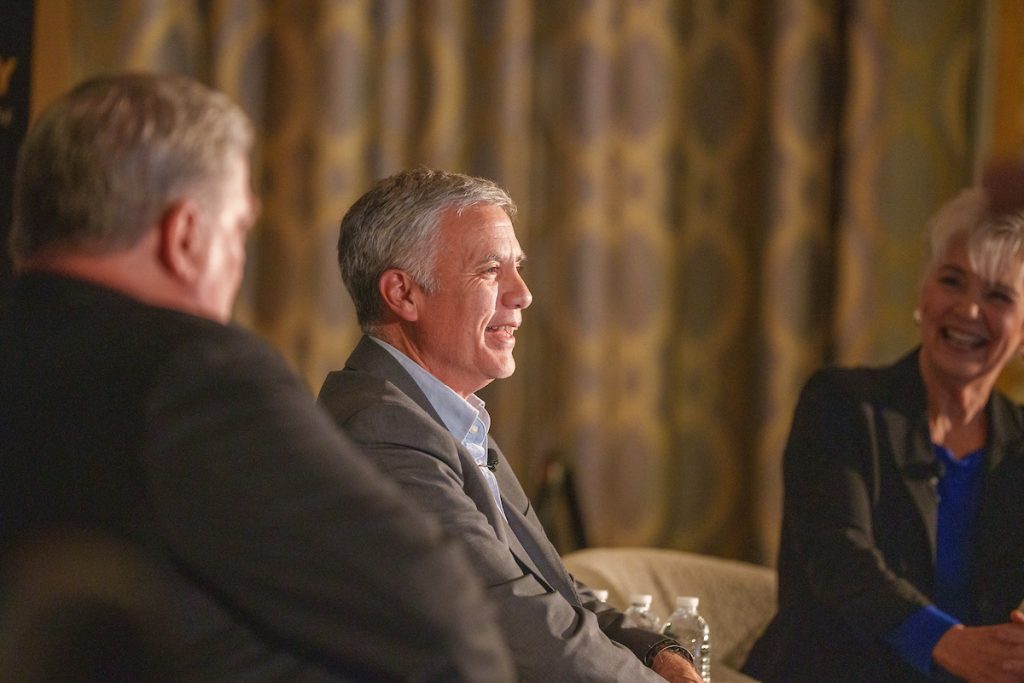In keynote remarks and a fireside chat at the Oct. 21 event, the former Chairman of the Joint Chiefs of Staff said global security threats are intensifying at a scope, scale and speed unmatched in human history.
Vanderbilt University's Institute of National Security welcomed more than 450 guests-including political dignitaries, alumni, faculty and students-to a Washington D.C. launch event on Oct. 21.
The evening featured Retired General Paul M. Nakasone, Founding Director of the Institute and former Commander of U.S. Cyber Command and Director of the National Security Agency, in conversation with Retired General Mark A. Milley, former Chairman of the Joint Chiefs of Staff. Jeanne Meserve, an award-winning correspondent and anchor for CNN and ABC News, moderated the discussion.
"The international landscape is profoundly different from the one that I encountered when I stood on top of the Berlin Wall 35 years ago," said Chancellor Daniel Diermeier, a German native, in opening remarks. "Meeting today's national security challenges will require a new spirit of radical collaboration."
Nakasone noted that in the 33 days between the Institute's Nashville launch on September 18, and the Washington, D.C. event, the world witnessed numerous complex challenges arise, including exploding cell phones and pagers in the Middle East; Iranian hackers disrupting Democrat and Republican U.S. presidential campaigns; and a "typhoon" referencing a type of foreign cyberattack against U.S. telecommunications providers.
"We are seeing … the definition of national security expanding," said Nakasone, who is also Distinguished Research Professor of Engineering at Vanderbilt. "The scope, scale and sophistication of what we're facing today is radically different from what we've seen in the past."
That was a sentiment echoed by Milley, who told the crowd that "the conduct of war is undergoing its most fundamental change in all of human history." He added that students graduating today from Vanderbilt, and programs within the Institute, would play a significant role in addressing a vastly different world in the next 10 to 20 years.
 Milley, who is a Distinguished Fellow in Residence at Georgetown University and a Visiting Lecturer at Princeton University, cited several contributing factors that will alter the global security landscape in the years ahead. Among these are a shift to a multipolar world, where conflicts rage simultaneously in various regions, as they are now in the Middle East, Ukraine and Asia; a mass migration to cities, portending a future marked by combat erupting primarily in densely populated urban areas; and a maturing of technologies ranging from AI and robotics to cyberweapons and social media-fueled propaganda.
Milley, who is a Distinguished Fellow in Residence at Georgetown University and a Visiting Lecturer at Princeton University, cited several contributing factors that will alter the global security landscape in the years ahead. Among these are a shift to a multipolar world, where conflicts rage simultaneously in various regions, as they are now in the Middle East, Ukraine and Asia; a mass migration to cities, portending a future marked by combat erupting primarily in densely populated urban areas; and a maturing of technologies ranging from AI and robotics to cyberweapons and social media-fueled propaganda.
"The next 25 years, in short, are not going to be like the last 25," Milley said. "The accumulating challenges we face and the profound change in the character of war is unlike anything our forces or our nation-or anyone on the globe-has experienced. And it's happening very, very fast."
 Addressing these challenges lies at the heart of the Institute's mission, Nakasone said. To achieve success, he added, Vanderbilt will harness the resources of a world-class research and teaching institution to educate a new generation of national security leaders, from undergraduates through mid-career professionals; to innovate new technological and policy solutions; to convene national security thought leaders; and to advise those working on national security issues that are rapidly broadening in their scope.
Addressing these challenges lies at the heart of the Institute's mission, Nakasone said. To achieve success, he added, Vanderbilt will harness the resources of a world-class research and teaching institution to educate a new generation of national security leaders, from undergraduates through mid-career professionals; to innovate new technological and policy solutions; to convene national security thought leaders; and to advise those working on national security issues that are rapidly broadening in their scope.
"Our goal here is to bring the world to Vanderbilt, and equally, bringing Vanderbilt to the world," Nakasone said.
NAKASONE AND MILLEY DISCUSS GLOBAL CONFLICT, PRESIDENTIAL OUTCOMES
In a wide-ranging discussion moderated by Meserve, Nakasone and Milley offered insights and expert opinions on topics that included the next chapter in the Middle East conflict, American weapons policy in Ukraine and the national security outlook based on the outcome of U.S. presidential elections.

Asked about the next chapter for Israel as conflict in the region continues on numerous fronts, Nakasone said it's impossible to forecast what direction the situation will take next. But he did emphasize that the world should not give up on trying to broker a diplomatic resolution, pointing out that "the U.S. has a central role to be able to solve this conflict."
Regarding Ukraine, Milley said he was a strong supporter of the country but pointed to the potential dangers of increased American involvement. In response to initial reports that North Korea sent troops to Russia, Milley said, "that should concern everybody."
Meserve asked both leaders if the U.S. risked becoming distracted by so many conflicts unfolding simultaneously around the world. Nakasone said as a world power, and a founding member of NATO, the U.S. has to be able to respond. "I think our challenge is to be able to have the agility-and the ability-to handle multiple crises at once," he said. "That's part of the reason this Institute is so important to me."
On the question of how national security policy may change based on the outcome of the U.S. presidential election, both were circumspect, saying either candidate would have to develop policies to address ongoing challenges. Milley laid out the candidates' differing visions in the context of two distinct periods in American history, both "very legitimate," he said. One would be to continue U.S. foreign policy as it has been conducted largely since the end of World War II as a leading global power. The alternative would be a "neo-isolationist" stance harkening back to the era of William Jennings Bryant or Andrew Jackson, in which policy is focused on U.S. domestic interests and those at the immediate borders.
Nakasone added that no matter what happens, either leader will likely confront a new "wild card" like the COVID-19 pandemic. "It is likely we'll see them have to react to something."
To learn more about Vanderbilt's Institute of National Security, or to join its mailing list, visit www.vanderbilt.edu/national-security.






